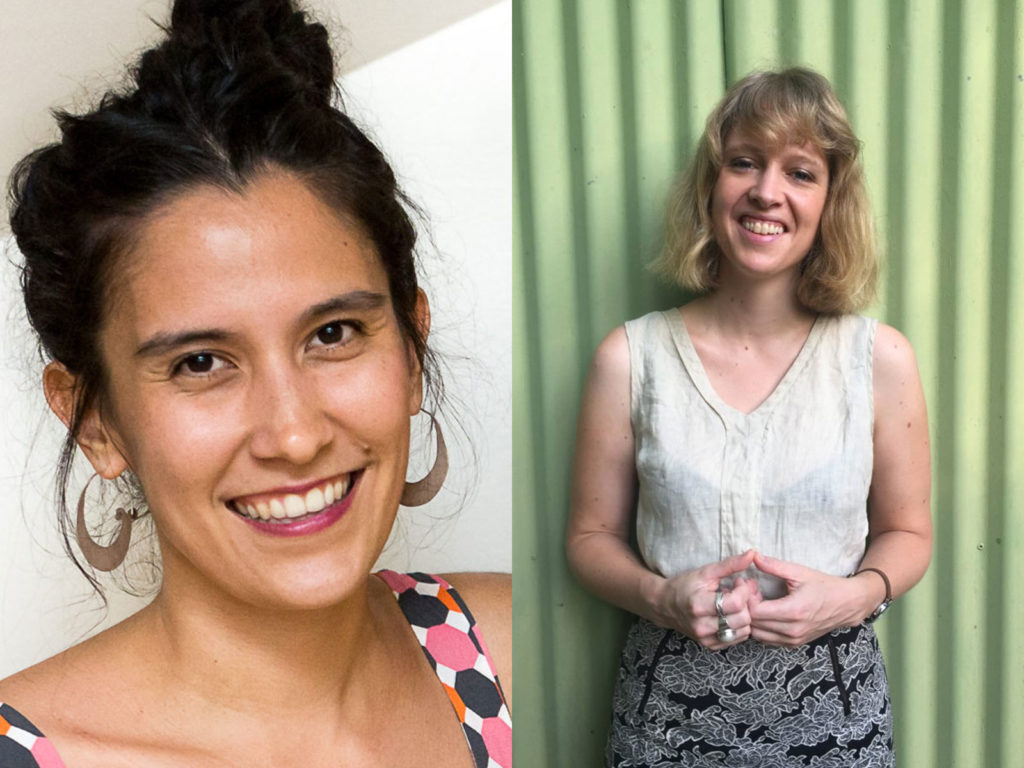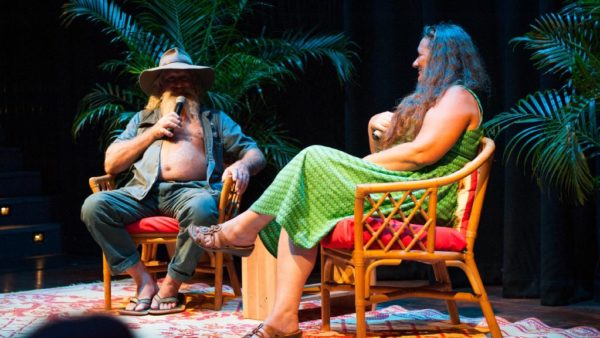Jess Ong and Rosa Ellen are producers of the SPUN Stories podcast. They told us about the perils of recording narration under the doona when you live in the tropics – and why there’s more to the Top End than crocodiles.

What piece of audio has had the most profound effect on you – as a listener, as an audio maker or both?
Rosa: The first Kitchen Sisters documentary that I heard, ‘The Rise and Fall and Rise and Fall and Rise of Thomas Alva Edison‘, and Steve Reich’s composition ‘Different Trains‘, from 1988, which samples people talking about wartime train journeys, with a string quartet and is really moving.
Jess: I was incredibly moved by a story from The Moth called ‘A New Home’ by Dori Samadzai Bonner. Dori came to The Moth via their pitch line, and her story is suffocatingly powerful. I remember getting home with ten minutes left to go, so I sat in my car in the driveway crying my eyes out. I also really love Note to Self for the thought-provoking subject matter, and the way it’s delivered so accessibly. I might also have a small crush on Manoush Zomorodi …
…they offer a completely different insight into the lives of people in the NT – there’s more to us than crocodiles!
Where did the idea for the SPUN Stories podcast come from?
Rosa: Jess, and Johanna Bell, run this great storytelling event here in Darwin called SPUN, and I really wanted to be involved somehow. At the same time, Johanna and Jess wanted to create a SPUN podcast … and the stars aligned.
Jess: As Rosa said, SPUN is a live storytelling night in Darwin that pops up once a quarter, each time with a new theme, to celebrate the stories of some pretty incredible locals who walk quietly amongst us. Johanna and I were keen to get a podcast up so these stories could be shared with interstate audiences, as they offer a completely different insight into the lives of people in the NT – there’s more to us than crocodiles!
We also thought SPUN’s podcast could be a bit like a one way ticket to a little adventure North; some armchair travel that could offer some warmth during the mundane commute in dreary weather!
What’s your favourite part of making it?
Rosa: Packaging the live stories in a way that makes them sound as good as they do on the night, and learning more about sound editing and production.
Jess: Collaborating with Rosa has been really exciting, and I’ve learnt a lot in the process. This experience makes hearing the final product all the more special. And recording the podcast was pretty amazing, particularly as we decided to do it on the same day a cyclone watch had been called, so the torrential rain on a tin roof was interesting and challenging!
What’s the hardest part of producing the podcast?
Rosa: Typical newbie things: finding a quiet space to record Jess’s voice, how to actually get the podcast on iTunes…!
Jess: Finding a quiet space was tricky, and early on I even attempted to record under a doona with the fan off. But the rivers of sweat dripping off me saw that idea quickly come to an end. I found it challenging at times to sound like my true self – it’s not that easy to sound conversational when you’re in a room on your own, talking to the dust mites!
It’s not that easy to sound conversational when you’re in a room on your own, talking to the dust mites!
What’s the best thing about working with sound?
Rosa: The creativity it allows you – to set a scene and create a mood.
Jess: I love how accessible it is, and that because you’re not presenting an audience with something visual or written, there’s so many meanings and experiences that can be drawn from the same piece of work. I think the best thing about sound/audio is how it transcends socio-economic, political and geographical boundaries. It’s a platform that’s largely within reach of anyone.
What’s the best (or worst) advice you’ve received about podcasting?
Rosa: Best advice – be organised with your sound files on your computer. Make it easy for yourself to locate things. And always prepare for interviews.
Jess: Think about your audience, and don’t diminish your voice by comparing it to how others sound. Also, back up your work!
What has been your biggest lesson as a producer so far?
Jess: If something doesn’t feel or sound right, it’s okay to let it go – being flexible and taking your time is important!
I think the best thing about sound/audio is how it transcends socio-economic, political and geographical boundaries. It’s a platform that’s largely within reach of anyone.
Do you interact with your audience, or receive feedback or criticism about your work?
Jess: We’ve sold out each live SPUN event since we began (in March 2015), so we’ve gotten to know some of our audience quite well, and they’re extremely generous with their empathy, engagement and feedback. If we’re on the hunt for storytellers, we’ll often ask for recommendations, and we’re also up for audience contributions around themes for future events! As for the podcast, we haven’t received any direct feedback/criticism yet, but when we do, we’ll be all ears!

If you could go out to dinner with any audio maker, who would it be – and what would you talk about?
Rosa: I’d resurrect Studs Terkel, and invite the Kitchen Sisters (Davia Nelson and Nikki Silva) over. I’d ask Studs about the art of interviewing, and the Kitchen Sisters about their whole approach.
Jess: I’d love to pick Manoush Zomorodi’s brains about how she builds these fascinating interactive projects into Note to Self, and what comes first – the project or the podcast? I’d also chat to Chuck and Josh from Stuff You Should Know, and ask why they decided to structure their podcast the way they have – it’s absolutely like sitting in on their personal conversations. I can’t get enough of it now, but it killed me at the start! It feels wrong to not have Ira Glass on this list, as he’s one of the reasons I got into podcasts back in the day.
What are you listening to at the moment?
Rosa: S-Town.
Jess: My list is pretty extensive, but at the moment it’s mainly S-Town, Pregnant Pause (about a couple deciding whether they want to have a baby!), Beautiful Anonymous, and I’m about to start on The Messenger from the Wheeler Centre.
I like that Australian audio is finding its own way, in its own time.
What’s your favourite Australian podcast, and why?
Rosa: I really like Earshot for its breadth of subjects and good storytelling.
Jess: I’m really enjoying The Unbearable Lightness of Being Hungry. Not only does it have the best name around, but it’s also fascinating. I love the way Lee Tran Lam gently weaves in questions that detour from the food world to the personal world. Conversations with Richard Fidler will forever be a favourite; it was so influential for me and continues to be.
What do you think is unique about Australian audio?
Rosa: I think Radio National has long been using interesting and experimental sound in its docos and programmes, and has world-class sound engineers.
Jess: That there’s no one sound or voice that’s distinctly Australian. I like that Australian audio is finding its own way, in its own time, and that there’s lots of experimenting going on. There’s also a really dynamic, supportive audio community in Australia, and that’s important, particularly for those of us in regional/remote areas!
What’s next for you as producers?
Rosa: I’m working on my own podcast about little-known stories and histories of the NT. This might have to expand if I leave the NT!
Jess: I’ll continue having an excuse to be a busy body with SPUN Stories, with both the live events and podcast. I also have a couple of ideas for other podcasts I’m about to start exploring!